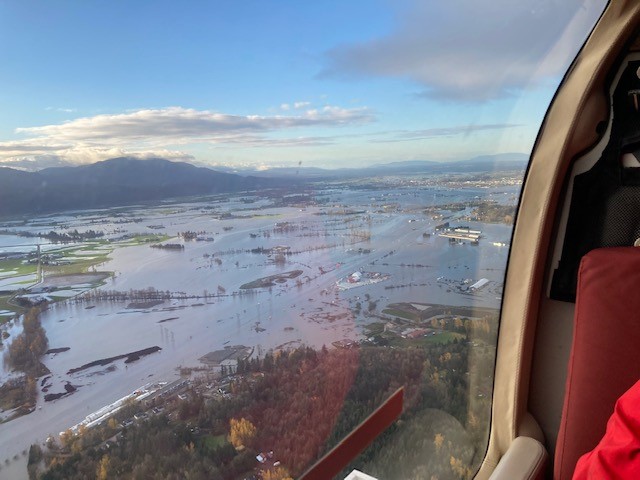Under the Agridome
Disaster in BC Farm Country
The scenes from British Columbia are heartbreaking. If you don't know, starting last Sunday British Columbia saw record rainfall that lasted for 48 hours and caused massive flooding and landslides across the southern part of the province.
This had the effect of cutting off much of the lower mainland from the rest of the province, as well as cutting off British Columbia from the rest of Canada. The economic ramifications of this will surely last a long time.
It is rare that I ever get to write about my own readers in trouble, but clearly farmers in the Fraser valley have been devastated by the massive flooding. The Fraser valley is a beautiful place full of dairy farms and poultry barns with the beauty of the mountains in the background. There are a lot of beautiful, picturesque parts of Canadian farm country, but the Fraser valley is certainly close to the top. Fraser Valley farmers were devastated by the flooding, something they probably couldn't imagine happening before Sunday.
British Columbia's agriculture minister Lana Popham said this last Wednesday, quoted from the Globe and Mail: "We have thousands of animals that have perished. We have many, many more that are in difficult situations, and we're seeing an animal welfare issue develop."
She told the newspaper said she's had many video calls with farmers whose farms have been flooded. In those calls, she said, "you can see the animals that are deceased. It's heartbreaking."
Some of this is hard to imagine but you see dairy cattle being led through shoulder high water. There are problems with feeding poultry and livestock feed cannot be delivered because roads are shut down.
P[L1] D[0x0] M[300x250] OOP[F] ADUNIT[] T[]
Several years ago, I got to visit Merrit, a nice town in the interior of British Columbia, surrounded by ranch land. It is now flooded to such an extent that all sanitation and water facilities have stopped working and the town has been evacuated. Every farmer throughout this area in British Columbia is scrambling for their collective livelihood. The mayor of Abbotsford has told Canada's Prime Minister Justin Trudeau that the damage could be over $1 billion CDN.
I am certainly not doing the damage justice, but there is more. In Ontario, we have IP soybeans containers that are shipped through the Port of Vancouver. There are also all the Western Canadian agricultural commodities that are shipped out of the West Coast. With rail lines cut, as well as roads combined with all this flooding, you can imagine how things can be backed up. We're talking about one of the biggest agricultural interruptions caused by natural events in quite some time.
This is the third time in just the last few years that British Columbia has enacted a state of emergency. They put one in place for COVID-19, there was one in place last summer for the heat emergency, and now for the flooding.
There are those that say this is how our changing climate might be affecting us again. I don't know. Every year British Columbia gets what they call the Pineapple Express, moisture and air from Hawaii that gives British Columbia rain and snow in higher elevations. It just so happens it came in record levels this year. I'm trying to be pragmatic here. I believe in climate change, but we cannot label every catastrophic natural event as another symptom of climate change. Sometimes it just rains too much.
With the agricultural and transportation landscape interrupted in British Columbia, there are shortages of food, gasoline and a whole host of other things. In the media, there are pictures of empty store shelves in grocery stores. The Fraser Valley provides much of the dairy products and poultry for British Columbia and with our supply management system fine-tuned to deliver supply, somebody is going to be working overtime trying to fill the gaps amid this disaster. It will not be easy and special provisions will likely need to be made.
What those special provisions will be, I don't know. I've always said that farmers in Canada shouldn't necessarily be expected to produce milk like I produce corn. Unbelievably, I have read some criticism of the supply-management system based on this disaster of the past few days. It's like these critics are expecting these supply gaps to be solved so quickly.
For instance, why not just import dairy or poultry products from the United States? I must say it was a little bit too much for my taste, as we're talking about a tragedy here with people losing not only their lives, but their livelihoods. Then there are the farm animals which perished as well.
I think it's just time to rally together when one area of Canadian agriculture is on the ropes.
Let's hope next week brings good news, like receding water levels and bright sunshine for British Columbia. Hopefully, everything will start coming together.
**
The views expressed are those of the individual author and not necessarily those of DTN, its management or employees.
Philip Shaw can be reached at philip@philipshaw.ca
Follow him on Twitter @Agridome
(c) Copyright 2021 DTN, LLC. All rights reserved.



